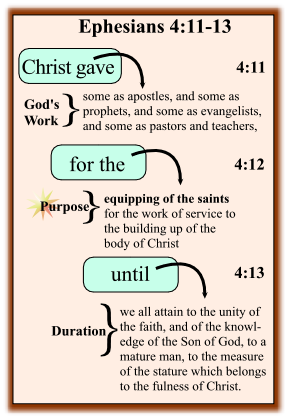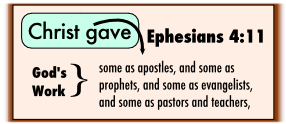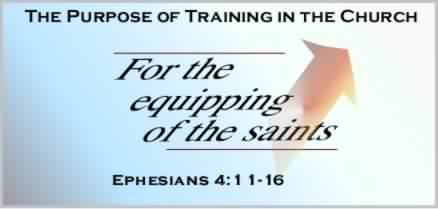This is part '2/7' to a study entitled 'The Purpose of Training in the Church: Equipping the Saints' on Ephesians 4:11-16. This section of commentary on Ephesians 4:11 explains how God enables His people to grow and become a strong a glorious church exuding Christ's love. The Lord provides apostles, prophets, evangelists and pastor-teachers. An index is provided at the bottom of the page.
 A) God’s Work in the Church (Ephesians 4:11-13)
A) God’s Work in the Church (Ephesians 4:11-13)
- The Bible Teacher's Commentary –
What is discussed in these verses is the followup of what God has done on the cross through Christ. We would expect the resurrected Lord Jesus to remain on earth but He didn’t. Instead, we know Christ’s Spirit came upon His people and lives through them. Christ is living Himself out through our lives. And so Christ in a real way is living His life out on earth through our lives. This is the concept we see in Christ being called the head and Christians His body. We are good stewards when we understand and cooperate with Christ’s purpose.
Christ established this extension of His ministry through working in each of our lives. We will see how this takes shape here in verses 4:11-13. A major shaper that has impacted every believer is the way Christ has distributed His spiritual gifts to His people.
1. The Means God enables His people (Ephesians 4:11)
2. The Purpose God has for His people (Ephesians 4:12)
3. The Final Goal God has for His People (Ephesians 4:13)
1. The Means God Enables His People
Ephesians 4:11
And he gave some [to be] apostles; and some, prophets; and some, evangelists; and some, pastors and teachers.
 The first thing that is mentioned is how God, through Christ, has made it possible for all of His people to receive the truth they need to live right and good lives. God gave certain gifts and associated them with certain key positions in the church. These men are not called leaders here but certainly play that influential part. There are four categories (though some suggest five): apostles, prophets, evangelists and pastor-teachers. Christ equips these certain persons with gifts and positions to train, equip and protect the sheep. Let’s first discuss what each of these gifts to the church might mean and then come back to how it relates to our own churches.
The first thing that is mentioned is how God, through Christ, has made it possible for all of His people to receive the truth they need to live right and good lives. God gave certain gifts and associated them with certain key positions in the church. These men are not called leaders here but certainly play that influential part. There are four categories (though some suggest five): apostles, prophets, evangelists and pastor-teachers. Christ equips these certain persons with gifts and positions to train, equip and protect the sheep. Let’s first discuss what each of these gifts to the church might mean and then come back to how it relates to our own churches.
(1) Apostles
Many think this term apostle is expressly used to describe the twelve apostles as seen in Acts 1. The concept of apostle certainly was initiated by the way Christ appointed the original twelve disciples which later became apostles. But there is no doubt that the word ‘apostle’ also has a much wider usage. For example, in Acts, Barnabas is called an apostle. “But when the apostles , Barnabas and Paul, heard of it, they tore their robes and rushed out into the crowd, crying out” (Acts 14:14). Barnabas and Paul were both called apostles.
The term ‘apostle’ means sent one. We can best understand the apostle’s special designation as a church-starter or in today’s terms, church planter. These individuals go into uncharted territory and establish the church of God. They define the basic truths of the Gospel: who Christ is, how a person is saved, what the Gospel is, etc. Cults function best in areas where the basic fundamental concepts of the Gospel were not clearly laid out. It is a pity that we need to talk to people from China or other unreached culture that Mormonism is not Christianity. Apostle literally means ‘sent one’ and is fully comparable to the term missionary that we use which comes from the Latin also meaning ‘sent.’
(2) Prophets
Much has been written on this topic in the last few decades. The Reformed tradition looks at the preacher as the prophet because he declares God’s Word to the people. They are right as far as they go, but they do not go far enough. The prophet takes what God has given to him and reveals it to God’s people. God is communing with the people. The prophet, however, both forthtold and foretold God’s Word. The New Testament records several future-telling predictions.
Even though there might be less emphasis on the latter, it should not be totally discarded as it often is. Many Christians would sever this latter aspect. They either relegate the prophet’s function to the historical past or redefine the prophet in the pastor’s role. This is sometimes done out of a desire to protect the written Word of God as our supreme revelation from God rather than mixing it with other kinds of messages. Who after all can verify that it is God speaking? But it is interesting that God used the foretelling aspect to prove that it the forthtelling was not a subjective (and thus twisted) message but real and from God. Someone has even carefully noted several famous Reformers were prophets who accurately foretold various future events.
In summary of this highly controversial topic, I would say three things.
-
-1- The perspective that limits the existence of prophets to the past is artificially contrived. God gave these positions. Who are we to say that Christ no longer gives them. This is written in the constitution of the church and must remain. Can we actually draw a line after prophets and dogmatically state that the first two categories were only for the early church? Many places around the world today are very similar scenes with the early church. They lack the written Word of God, forms of paganism and ungodly philosophies, and the absence of any church seem to make this instruction crucial.
-
-2- It is very possible some have rejected current apostles and prophets in order to protect themselves from the influences of the Roman Catholic Church’s pope and of characters from the charismatic movement. As a whole the Western church no longer recognizes, encourages or utilizes these needed gifts in our midst. We need to return to God’s Word even if we must gingerly do it. What would our church be like without the other posts and gifts such as pastor-teachers? Deformed. And I suggest it is deformed today because of the lack of belief in what God has so clearly spoken. (By the way, I do not have this gift and am not secretly defending myself).
-
-3- Lastly, I would call the church to peace as Paul the Apostle called us in the first verses of this chapter. It is okay to disagree, but we must pronounce our unity despite differences on definitions and concepts hidden in a word like prophet.
(3) Evangelists
The church has allowed the media to redefine the concept of evangelists. In many people’s minds, it is a person who speaks and charms thousands down to the auditorium's floor in repentance. This disguises the real meaning of the evangelist. It again is not his charm or winsome personality but the Spirit of God working through the evangelist’s message that releases the Gospel into the hearts of men so that the Spirit of God can use it to convert the souls He is working in.
When I was in India, we saw many young men going out as evangelists.They had no real education, but they knew the Lord and were zealous in going village to village preaching the Gospel. Just yesterday I heard of a person asking a young Chinese person to praise God for what he did. He said he was an evangelist. When asked how old he was, “He said fifteen.” Now we might have questions about the wisdom of this. After all he had no education (though he did read the whole Bible 38 times). He had no seminary degree nor would he ever be able to get one. But he focused on what God had called him to do. Let me make a few comments.
Our focus on education is wrong. We should instead return to Biblical qualifications. In many cases, this emphasis on education and degrees is wholly self-serving. It is easy for those who have degrees to say that it is mandatory to serve. And surely it is ‘abiblical’ (not Biblically taught or illustrated). Should we not instead reevaluate our ways!? The Spirit of God is bringing the Gospel to many villages in this world through uneducated evangelists. Surely we cannot dismiss this, can we? Why can we not further encourage this work among ourselves rather than taking the best years of our young people whose minds are filled with foolish words and whose lives are laden with heavy debt.
(4) Pastor-teachers
Let us speak about pastor-teacher as one gift/position. Either way, we cannot dogmatically use our conclusions to define our ministries. A pastor cares for a local group of God’s people, sometimes more. He has a narrow focus. The apostle focuses on a region. The prophet focuses on the relevant target, be it group or individual. The evangelist focuses on the unreached. The pastor-teacher sets his heart on training the people in his own congregation. This does not mean that others do not disciple God’s people. One key aspect that shapes the gifting is the kind of ministry involved.
I have been involved as a missionary (sent one -church planter), as evangelist, going here and there spreading God’s Word as well as pastor-teacher. Each is very different but to some degree everyone is doing the same. The difference is the concentration of what one is teaching and preaching as well as the target group. As an evangelist, the teaching from God’s Word is not deep. People are not believers.
Our comment here for pastor-teachers is true for the above. The church has focused too much on this full-time concept. Paul does not write of it here. Many pastors will no doubt become full-time servants of God. That is wonderful. My guess is that many others will not. But what is most important is that we all pay attention to what God wants of our lives!
Each congregation can have several pastor-teachers even though perhaps only one is called or paid as a pastor. They might also have one or two prophets and several evangelists. The true pastor-teacher will almost always easily be found because he will be doing what defines him. He might be an engineer but his heart is on caring for the sheep. Full-time service has many advantages but let each serve faithfully where God appoints them. If we broaden our concepts here a bit, I think we will come away refreshed and perhaps excited. We focus on God raising up such men rather than it being something that a person chooses as an occupation.
Conclusion
God will be calling and raising leaders from among our congregations to these positions. Are we one of them? Are we so burdened down by misconceptions that we cannot seek God’s best for our congregations? If we start opening our eyes in faith to the God who is serious about equipping the church, then He indeed will bless us. We must not succumb to the doubt that we do not need any of these gifted men. May God all the more equip us like the Antioch church. God is serious about training His people. We need to get with it and start recognizing those He has gifted around us otherwise we will never get where God wants to take us.
We now need to understand why God gave such gifts to the church. He is very purposed in His provision of these instructors. Next =>
Read more exciting and practical articles on the Book of Ephesians.
Introduction to the Book of EphesiansPaul's Second Missonary Journey to Ephesus - Map Ephesians 1Ephesians 1:1-3 Every Spiritual BlessingEphesians 1:1-3 Every Spiritual Blessing Ephesians 2-3Ephesians 2:1-3 Our Need, His graceEphesians 2:1-3, an Introduction |
Ephesians 4Ephesians 4:1-3 Preserving the Spirit's UnityIntro: Problems of Disunity Ephesians 4:11-16 The Purpose of TrainingEphesians 4:11-13: A) God's Word in the Church Ephesians 4:14 B) Responsibility 1. Deceit Ephesians 4:11-14 Chart: Equipping of the Saints Ephesians 5-6Ephesians 5:22,24 Wives be Subject to your Husband |
Biblical Foundations for Freedom
Paul J. Bucknell
